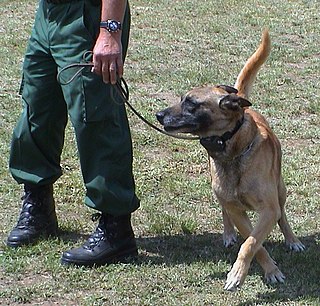Related Research Articles

Schutzhund, currently known competitively as IGP and previously as IPO, is a dog sport that tests a dog's tracking, obedience, and protection skills, and evaluates if a dog has the appropriate traits and characteristics of a good working dog. It was developed in Germany in the early 1900s as a suitability test for German Shepherds, but soon became the model for training and evaluating all five of the German protection breeds, which included Boxer, Dobermann, Riesenschnauzer, and Rottweiler. Though any breed of dog can participate, today the sport is dominated by German Shepherds and the Belgian Malinois breed. Dog owners and handlers participate in Schutzhund clubs as a group activity for training the dogs, and clubs sponsor trials to test the dogs and award titles. The best dogs can qualify to participate in national and international level championships.
Cynology is the study of matters related to canines or domestic dogs. In English, it is a term sometimes used to denote a serious zoological approach to the study of dogs as well as by writers on canine subjects, dog breeders, trainers and enthusiasts who study the dog informally.

The Irish Terrier is a dog breed from Ireland, one of many breeds of terrier. The Irish Terrier is considered one of the oldest terrier breeds. The Dublin dog show in 1873 was the first to provide a separate class for Irish Terriers. By the 1880s, Irish Terriers were the fourth most popular breed in Ireland and Britain.

The United Kennel Club (UKC) is a kennel club founded in 1898 in the United States. In contrast with the American Kennel Club, which is non-profit and which only clubs can join, the United Kennel Club is a profit-making corporation, open to individuals.

A therapy dog is a dog that is trained to provide affection, comfort and support to people, often in settings such as hospitals, retirement homes, nursing homes, schools, libraries, hospices, or disaster areas. In contrast to assistance dogs, which are trained to assist specific patients with their day-to-day physical needs, therapy dogs are trained to interact with all kinds of people, not just their handlers.

Clicker training is a positive reinforcement animal training method based on a bridging stimulus in operant conditioning. The system uses conditioned reinforcers, which a trainer can deliver more quickly and more precisely than primary reinforcers such as food. The term "clicker" comes from a small metal cricket noisemaker adapted from a child's toy that the trainer uses to precisely mark the desired behavior. When training a new behavior, the clicker helps the animal to quickly identify the precise behavior that results in the treat. The technique is popular with dog trainers, but can be used for all kinds of domestic and wild animals and small children.

Crate training is the process of teaching a pet to accept a dog crate or cage as a familiar and safe location. Advocates claim that dogs are den-dwelling animals and that a crate can become a den substitute. Most puppies can learn to tolerate crate training if it is introduced properly. The initial stress from being confined can give way to "increased feelings of security, safety, and comfort" after repeated exposure to the crate. Long-term or excessive crate confinement "may lead to emotional and behavioral deterioration over time." On the other hand, if properly done, crate training can play a major role in housebreaking a dog as fast as possible. Ordinarily, it is seen as a way of confining a dog and restricting its movement and freedom. However, crate training can help dogs gain full bowel and bladder control while enjoying treats and comfort. If crate training is not taken seriously, the dog may start soiling around the house.

Dog training is the application of behavior analysis which uses the environmental events of antecedents and consequences to modify the dog behavior, either for it to assist in specific activities or undertake particular tasks, or for it to participate effectively in contemporary domestic life. While training dogs for specific roles dates back to Roman times at least, the training of dogs to be compatible household pets developed with suburbanization in the 1950s.
A dog collar is a piece of material put around the neck of a dog. A collar may be used for restraint, identification, fashion, or protection. Identification tags and medical information are often placed on dog collars. Collars are often used in conjunction with a leash for restraining a dog. Collars can be traumatic to the trachea if the dog pulls against the restraint of the leash, causing severe pressure to the neck. Use of a harness instead of a collar may be beneficial for dogs prone to tracheitis or those with a collapsed trachea. Conversely, dog breeds with slender necks or smaller heads may easily slip out of collars that are too loose. This can be avoided by using a martingale dog collar which tightens to distribute pressure around the neck when training the dog not to pull. Any style of dog collar must be properly fitted to ensure safety and collars should not be worn when the dog is unattended.

Animal training is the act of teaching animals specific responses to specific conditions or stimuli. Training may be for purposes such as companionship, detection, protection, and entertainment. The type of training an animal receives will vary depending on the training method used, and the purpose for training the animal. For example, a seeing eye dog will be trained to achieve a different goal than a wild animal in a circus.

Victoria Stilwell is an English author, dog trainer and television presenter. Stilwell has appeared as a pet behavior expert and served as a producer on several international TV series including Dogs Might Fly, Dogs With Extraordinary Jobs, and Greatest American Dog (CBS), and is best known as the star and creator of the dog training TV show It's Me or the Dog. She is a leading proponent of positive reinforcement-based dog training tools and methods to provide pet behavior advice instead of traditional methods which typically employ multiple approaches including the use of pain, fear and intimidation. She is the Editor-In-Chief of the Positively.com website, the founder and president of the Victoria Stilwell Academy for Dog Training & Behavior, the CEO of the Victoria Stilwell Positively Dog Training (VSPDT) network of dog trainers, and other dog behavior institutions. In 2017, she received an OBE for her charity work.
Sophia Yin was a veterinarian, applied animal behaviorist, author and lecturer. She was a pioneer in the use of positive reinforcement for training dogs, and was widely recognized as an expert in the training of pets.
It's Me or the Dog is a British television program featuring dog trainer Victoria Stilwell who addresses canine behavioral problems, teaches responsible dog ownership and promotes dog training techniques based on positive reinforcement. There was also an American television version of the show which ran for four seasons. The show currently airs in about 50 countries worldwide.

A shock collar or remote training collar is any of a family of training collars that deliver electrical stimulation of varying intensity and duration to the neck of a dog via a radio-controlled electronic device incorporated into a dog collar. Some collar models also include a tone or vibrational setting, as an alternative to or in conjunction with the shock. Others include integration with Internet mapping capabilities and GPS to locate the dog or alert an owner of his/her whereabouts.

Joel Silverman is a celebrity animal trainer who hosted Good Dog U on Animal Planet from 1999–2009.
Sarah Wilson is an American author, dog trainer, and international speaker. She is the author of eight books about subjects related to pet ownership.
Jonathan Philip Klein (1956-2016) was an American expert in dog training and behavior consultant based in Los Angeles.
Michael B. Ritland born in Waterloo, Iowa is a former United States Navy SEAL, public speaker and dog trainer. He created the Warrior Dog Foundation, to provide care to dogs that have ended their service in battle front, and the Team Dog Online Training Community.
Sassafras Lowrey is an author and dog trainer. In 2013, the Lambda Literary Foundation awarded hir the Betty Berzon Emerging Writer Award.
References
- ↑ "Pat Miller among 45 people who have changed the dog world". www.heraldmailmedia.com. Retrieved 2021-01-27.
- ↑ "Fairplay woman receives Lifetime Achievement Award by The Association of Professional Dog Trainers". www.heraldmailmedia.com. Retrieved 2021-01-27.
- ↑ "What you need to do before bringing home a new pet". www.washingtonpost.com. Retrieved 2021-01-27.
- ↑ "Pat Miller, CBCC-KA, CPDT-KA". peaceablepaws.com. Retrieved 2021-01-27.
- ↑ "Dog trainers in county this week". www.heraldmailmedia.com/. Retrieved 2021-01-27.
- ↑ "Pat Miller, CBCC-KA, CPDT-KA". www.whole-dog-journal.com/. Retrieved 2021-01-27.
- ↑ Miller, Pat (July 2004). "Young Dogs Can Learn From Older Well-Behaved Dogs". The Whole Dog Journal. Retrieved 1 December 2012.
- ↑ Miller, Pat (2012). The Power of Positive Dog Training. Howell Book House. ASIN B00DNKY8ZM.
- ↑ Miller, Pat (2006). Positive Perspectives: Love Your Dog, Train Your Dog. Dogwise Publishing. ASIN B002RL92W2.